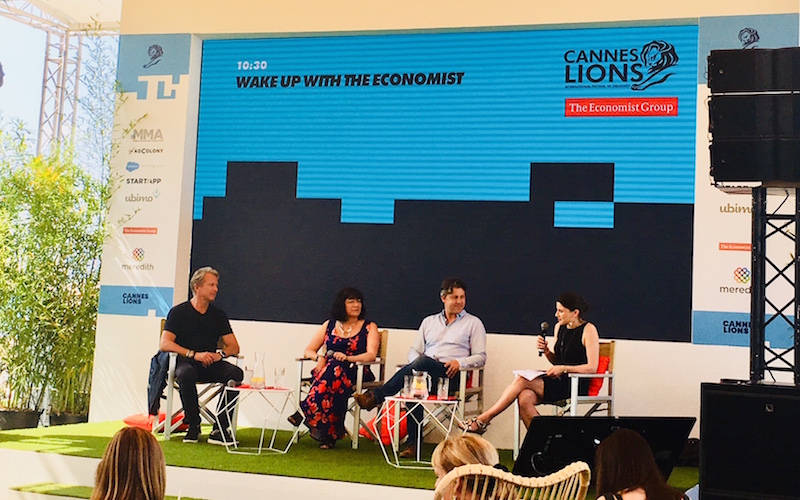Maja Pawinska Sims 19 Jun 2018 // 1:47PM GMT

CANNES — The biggest challenges facing marketers include getting the balance right between creativity and data, and humans and AI, according to leading global CMOs at the Cannes Lions International Festival of Creativity.
Speaking at the first Wake Up With The Economist session of the week, Syl Saller, chief marketing officer at Diageo, said: “I’m tired of this debate about creativity versus data, when we believe that clearly it’s both. We put creativity on a pedestal but we think you can measure it and we have a sophisticated way of doing that on the desktop of all 1,200 Diageo marketers. It’s a revolution for us but I don’t want to imply that everyone has to invest a whole load of money in a fancy tool. The real point is that there are principles for amazing creativity, and knowing what’s working unlocks money to invest more in that great work.”
Asked where the rise of artificial intelligence and machine learning left the role of marketers, Saller said: “AI can do a lot of things. It can really help to measure campaigns, to optimise media buying, all the great stuff that makes us more effective, expands our margins and means we can invest more in the brand. But one of the most valuable skills going forward is creativity and creative thinking. Wouldn’t it be great if AI took the gruntwork out and freed people up to be even more creative? If that happens, AI doesn’t replace us, but empowers us.”
Fellow panelist Marc Mathieu, chief marketing officer at Samsung Electronics America, agreed: “I really believe that the Internet of Things and AI will take over the 40% of work we don’t like doing and that is repetitive in nature, and that will enable us to be more creative and do more meaningful things as users and consumers.”
Mathieu also said the onus was on marketers to “sell less and serve more”: “We bombard people with 10,000 messages a day on their digital networks and I don’t think any of us saw that coming. We have an opportunity to think how we evolve the marketing we do to sell a bit less and serve that community a bit more. To think about not just invading people’s lives but helping people hussle through their lives, not using AI to use data to get more intrusive, but on the contrary, to support and serve people better.
“We’re at an interesting moment in time – we’re about to have even smarter technology and we have a collective responsibility in what we decide to do with our marketing dollars in the future.”
Also on the panel was Godert van Dedem, VP and CMO EMEA at eBay, who said even at a company that relies on machine learning to inform searches and performance marketing channels, creative storytelling was still critical: “We use AI on a massive scale but if we want to appeal to people emotionally, we have to use creativity and that’s more important than ever. We do that through compelling storytelling around our rich community of sellers, having them tell their story on why they sell and how started their business, and then measure the impact on that on our brand.
"The tension of man and machine is here. Technology is a phenomenal enabler, but don’t forget creativity and storytelling: it’s a deeply human activity and not one that can be done by a machine.”
Another key theme for the panel was how brands deal with the speed of technological and societal change. At Diageo, Saller said: “It’s about how we equip people to cope with speed, and with changing context. A lot of it comes down to mindset. When you realise how much volatility there is in the world, your repertoire for how you can lead gets so much bigger.
“For instance, we took one brand leader out of a developed market where his biggest problem was that Tesco had stopped promoting his product, to somewhere in Africa where there were issues with politics, elections, tax, and not always having electricity. It gave him an entirely different focus; we need to train people to cope with context and change, and expect it.”
At Samsung, Mathieu said the brand was constantly playing in the tension between speed, and consumers’ relationship with the brand and understanding of the technology: “Our job is to make mobile phones faster and faster, but we also need to focus on brand experience. For instance, we created a space in the Meatpacking District in New York that’s all about the products and the brand experience and we’re rolling it out across the US and beyond. Bringing technology to people is important and people still want to experience products before they buy them, even if they buy online.”


































.jpg)

















